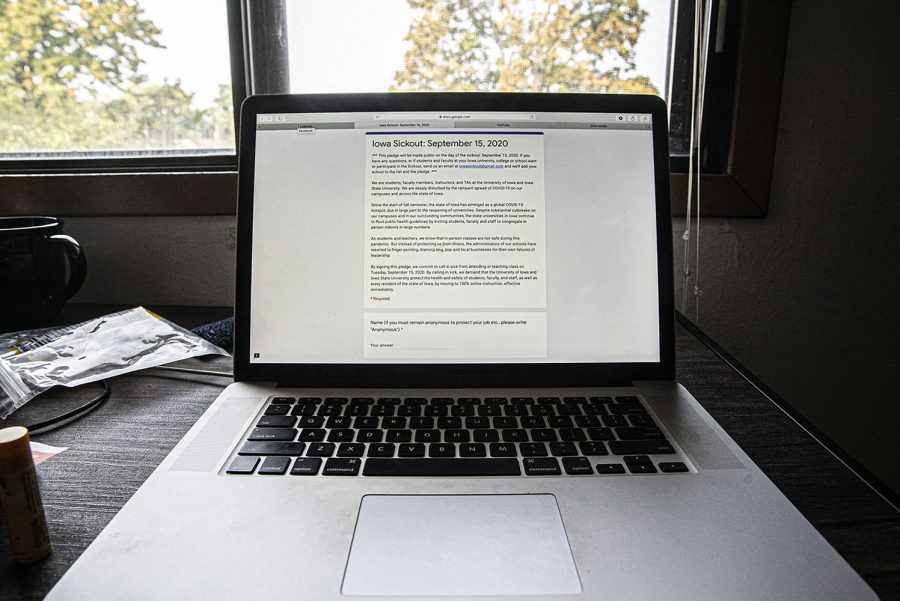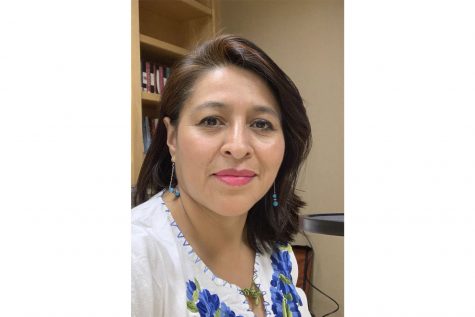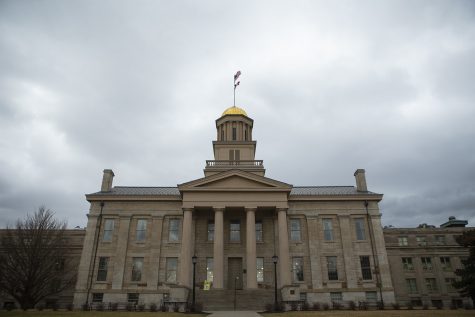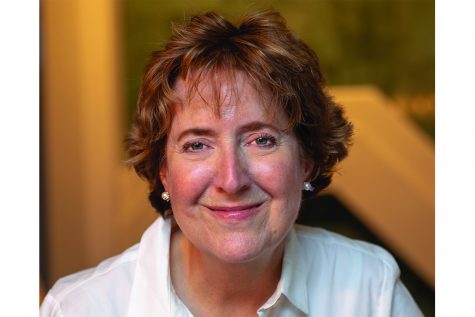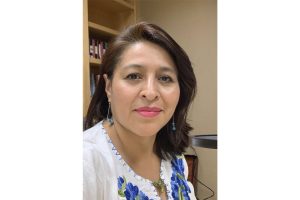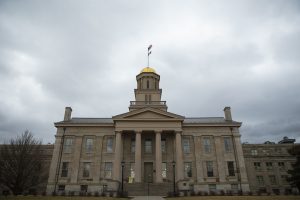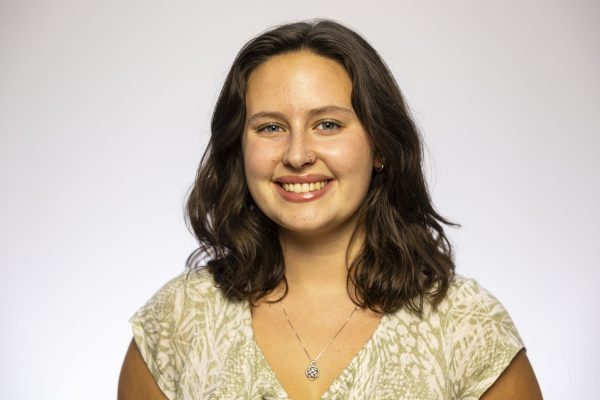Second sickout brings UI and Iowa State together
Ames and Iowa City have both experienced COVID-19 breakouts in the first few weeks of class. Students and faculty from both Iowa universities called in sick on Sept. 15 to advocate for online classes.
The September 15th sickout information form is seen on Monday, September 14th, 2020. To protest the reopening of in person classes at the University, another sickout is being coordinated alongside Iowa Sate University on September 15th.
September 15, 2020
The University of Iowa and Iowa State University are often against each other in their state school rivalry, but on Sept. 15, students and faculty from both universities joined together to call in sick and demand online classes for another sickout.
As of 1:30 p.m. on Sept. 15, the UI sickout received 510 pledges, which were fairly evenly split between the two schools, according to UI sickout organizers. Some University of Northern Iowa and Kirkwood students also signed the pledge.
In an email to The Daily Iowan, UI sickout members said they were contacted by Iowa State University organizers who wanted to organize a sickout at their school. The UI held their first, independent sickout on Sept. 2, in which 916 students, faculty, and staff participated, the members said.
RELATED: Students, instructors, pick up the phone to call in sick, demand virtual learning
“The first sickout was successful in terms of numbers, but this sickout is focused on showing solidarity with other college communities across Iowa,” UI sickout organizers said. “We are aware that this is not a problem unique to the University of Iowa and its administration. Across Iowa teachers, students, staff, and faculty, are risking COVID-19 exposure due to face-to-face instruction. By partnering with other schools, we hope to bring more attention to our cause, and to show people that this isn’t just a UIowa issue — in fact, these harmful decisions are being made statewide and nationwide.”
Since students returned to campus, both Ames and Iowa City have been named hotspots for COVID-19. The latest COVID-19 update at the UI reported 1,804 students and 27 employees have self-reported a positive COVID-19 test since the beginning of the semester.
In Iowa State’s most recent update, the university reported 976 students, 11 graduate assistants, 23 staff and two faculty members have tested positive since Aug. 19.
“Collectively, this action aims to bring attention to the mismanaged reopenings of campuses across Iowa,” said UI sickout organizers.
In a press release sent on Sept. 14, Alexa Rodriguez, an Iowa State student who was previously hospitalized with COVID-19, shared her support for the sickout.
“I’m terrified to go to my in-person class,” she said. “The only reason why we haven’t shut down is because President Wintersteen and the Board of Regents are trying to milk us for every last cent of tuition first. I’m already in massive amounts of debt for this degree, but now they want me to risk my life too.”
Rodriguez is a member of Iowa Student Action, which promoted the sickout on Twitter and Instagram.
About 78 percent of undergraduate hours are conducted online at the UI, and UI officials have warned that sending students home now would only spread the virus to people’s home communities.
RELATED: No spring break at UI, classes to remain in hybrid format for spring semester
UI junior Demitri Makeig, who is majoring in theater, said he participated in both of the sickouts. On Sept. 15, both of his classes were already canceled by the teaching assistants that lead them, who Makeig said have been vocal in class about their concerns.
“I’m just so appalled by the university just sending out so many emails over the summer being like ‘We got, we care about your lives. We’re doing so much’ and then it’s kind of all falling apart these past couple weeks,” he said. “It’s just very evident now that they’re not going to do anything until what seems like the tuition refunds are done, so they can cash their checks.”
Makeig, who also supports the Black Lives Matter movement, said he is ‘all about a protest’ and noted the ways that the COVID-19 intersects with BIPOC issues. He noted the racial disparities in how COVID-19 affects minorities, and said BIPOC students may not have the same access to resources that make in person class the best choice for them.
UI teaching assistant Steven Glavey, Makeig’s playwriting teaching assistant who canceled class for the sickout, said as a person of color, he was frightened for his life and the lives of others after seeing how people of color have been hospitalized and killed by COVID-19 at higher rates than white people.
Glavey said he also was motivated to cancel class to show his undergraduate students that he stands in solidarity with them, as he thinks the UI unfairly blamed those students.
“I think it’s important for me to show my students that they are not alone and that their instructors see the horrible nightmare that they are suffering under too. And also to show them that other people see the way that the University is lying and the way that the university is trying to use them as the scapegoat,” Glavey said.



